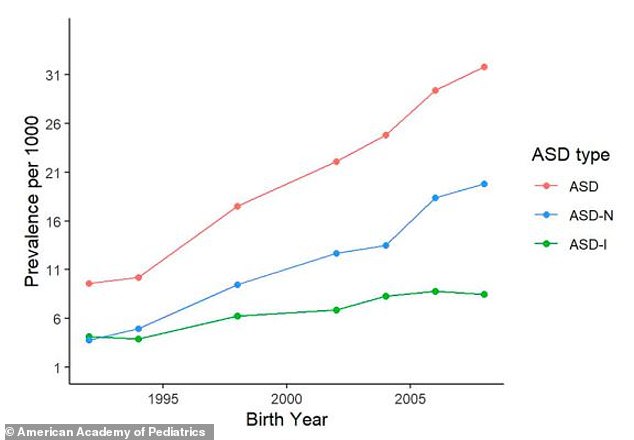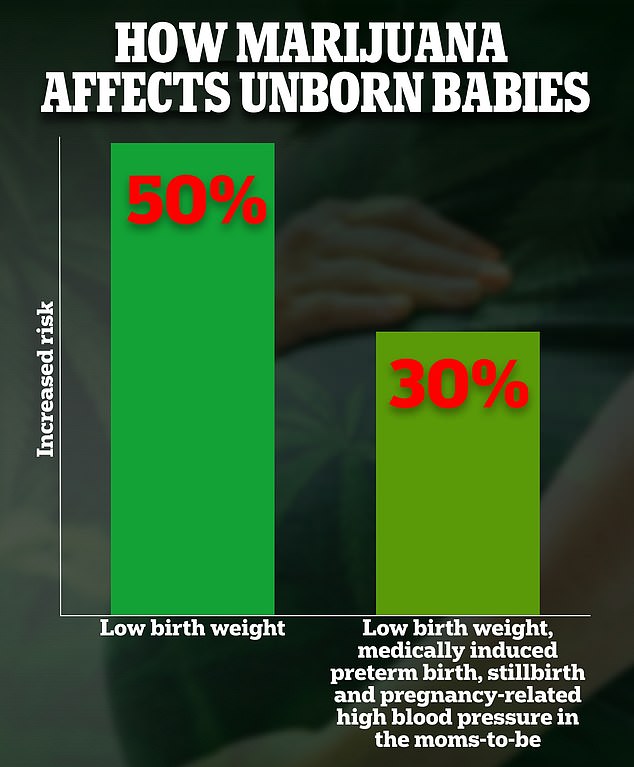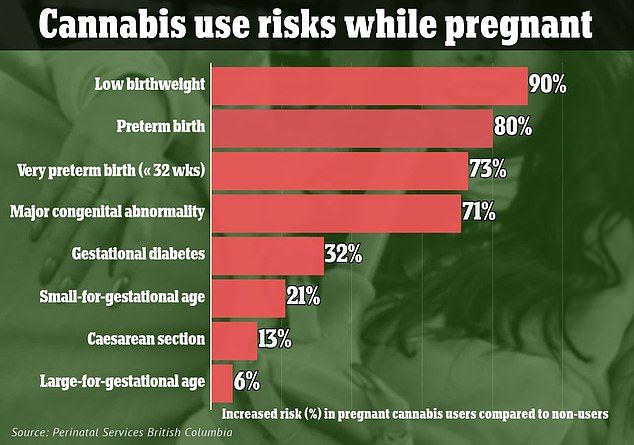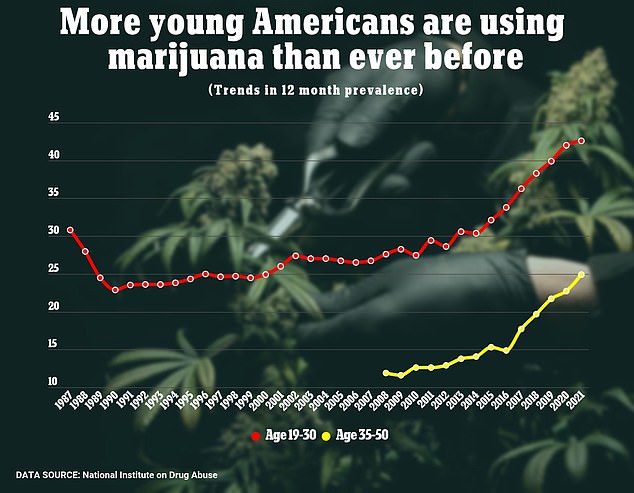Marijuana use during pregnancy may lead to an increased chance of the child being born with autism or ADHD, a first-of-its-kind review suggests.
Researchers from Australia analyzed 14 studies involving nearly 400,000 pregnant women and their babies conducted over the past 20 years.
They found that exposure to marijuana in the womb was associated with an up to 30 percent increased chance of the child being diagnosed with autism or ADHD — two conditions that are on the rise in the United States.
The review said the link between cannabis and the disorders was ‘not well understood’, but previous research has shown that exposure in the womb leads to genetic changes for the child.

Researchers in Australia found that pregnant women who use marijuana were more likely to have children diagnosed with ADHD and autism


The graph above from the new Rutgers study shows autism prevalence estimates per 1,000 eight-year-old children in New Jersey overall and by intellectual ability. The proportion of eight-year-olds diagnosed with autism who do not have intellectual disabilities rose more steeply (shown by the blue line) than those who do not (shown by the green line)
The team called for increased efforts for children who have been exposed to cannabis and for pregnant women to avoid the drug.
The findings come as data shows more young people are smoking cannabis than ever before, with use among pregnant women doubling between 2002 and 2017, the most recent year data is available.
About 24 states allow the use of marijuana recreationally and 38 allow medical use.
In some cases of miscarriage or stillbirth where the expectant mother used marijuana, they can be found guilty of ‘chemical endangerment of the fetus’ with a sentence of up to 99 years.
The new review included 14 studies. Ten of these focused on the effect of prenatal cannabis use on ADHD, which were conducted between 1999 and 2022 and included 203,783 participants.
The rest looked at the link between pot and autism. These were conducted between 2020 and 2023 and included 173,035 participants.
They found that weed use during pregnancy led to a 13 percent higher risk of children developing ADHD, as well as a 30 percent increased risk of autism.




A 2022 study by Perinatal Services British Columbia found that marijuana use during pregnancy was most often associated with low birth weight, preterm birth, birth defects, gestational diabetes, and increased risk of cesarean section


Cannabis is the most commonly used federally illegal drug among pregnant women in the United States, with use among pregnant women doubling between 2002 and 2017, the most recent year data is available.
“The mechanism by which prenatal cannabis use may cause neurodevelopmental disorders such as ADHD symptoms and ASD in human offspring is not well understood,” the researchers wrote.
The team noted that animal studies suggested that cannabis alters the amount of the feel-good chemical dopamine that the brain produces, which can lead to cognitive impairment and problems regulating emotions.
It is also believed that when a person consumes marijuana during her pregnancy, tetrahydrocannabinol, also known as THC, and other chemicals pass to the baby through the mother’s placenta, which supplies the baby with its nutrition and oxygen through the umbilical cord.
The researchers noted that the review has several limitations, namely the small and non-diverse number of studies. Additionally, they did not look at how much marijuana the women consumed or how they used it, such as smoking or edibles.
The findings come amid an increase in autism and ADHD diagnoses.
For example, a study published last year from Rutgers University found that between 2000 and 2016, ASD diagnoses in children under the age of eight increased from 10 per 1,000 to 30 per 1,000 in New York and New Jersey.
A similar increase has been seen nationally – with rates rising from one in 150 in 2000 to one in 54 in 2016.
And ADHD diagnoses in adults, particularly women in their 20s and 30s, are on the rise across the UK, with a 20 per cent rise in just one year.
Mountains of new research have suggested that smoking weed while pregnant can have lasting consequences for both mother and baby.
Last year, University of Utah researchers found that babies who were exposed to cannabis while in utero were 1.5 times more likely to have low birth weight compared to babies who weren’t.
That team also found a 30 percent increased risk of medically induced premature birth, stillbirth, and pregnancy-related high blood pressure in mothers-to-be.
Dr. Robert Silver, professor of obstetrics and gynecology at the university, said: ‘Cannabis use is not safe… you should not use cannabis during pregnancy.’
A study in American Journal of Obstetrics & Gynecology suggested that cannabis use in the first six to 14 weeks of pregnancy can lead to several adverse birth effects, including poor fetal growth, stillbirth and an increased risk of pregnancy-related high blood pressure, which can be life-threatening.
In addition, research in the journal Frontiers in Pediatrics found that when mothers used marijuana during the first three months of pregnancy, their babies weighed an average of one-third of a pound less than babies whose mothers did not use cannabis.
Dr. Beth Bailey, lead author of this study and director of population health research at Central Michigan University, told CNN: ‘Low birth weight is one of the strongest predictors of a child’s long-term health and development.
“These children are more likely to have developmental delays, higher rates of ADHD, learning disabilities and have higher rates of emotional problems.”
The new study was published this month in Journal of Psychiatric Research.

